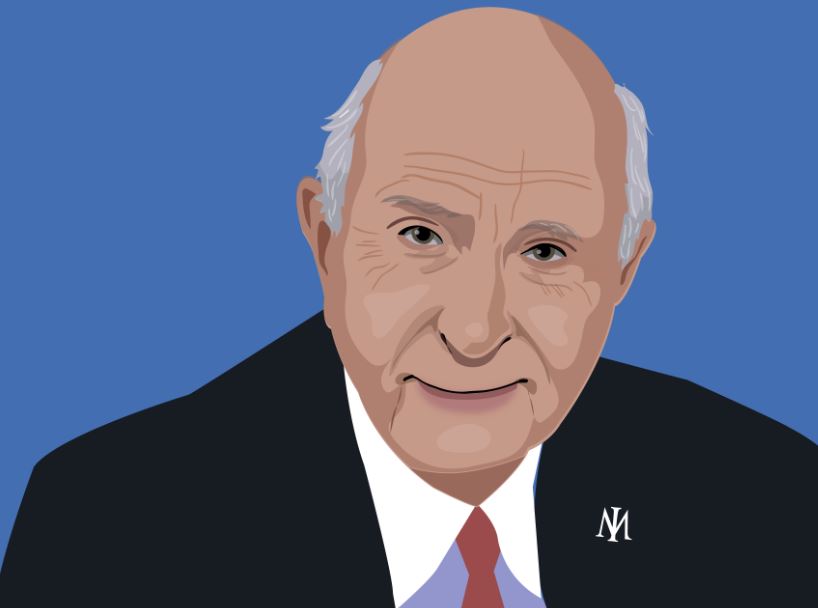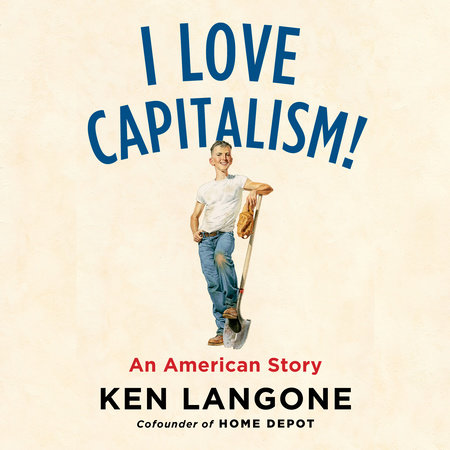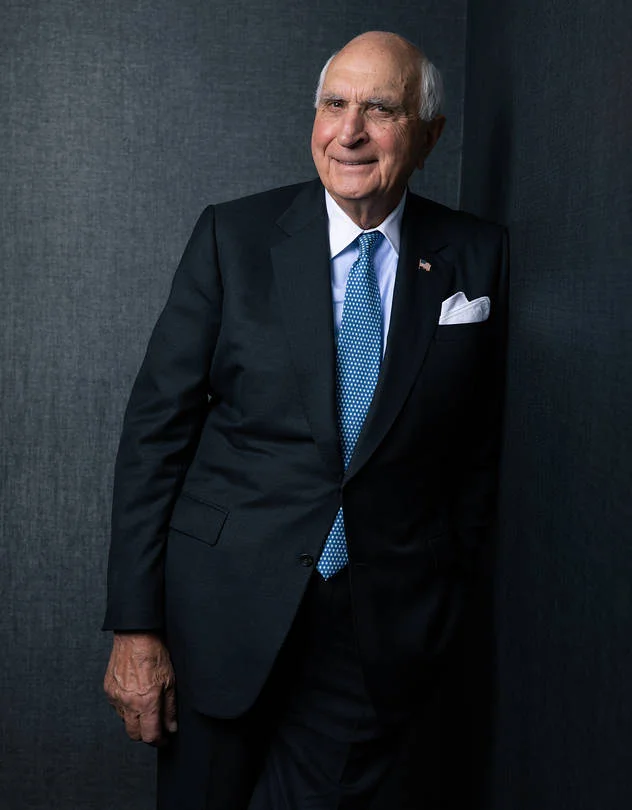I’m sure you’ve realised by now that I love learning. And stories about successful investors and business people are right at the top of my list when I choose what it is I want to learn. I believe I understand my own strengths and limitations, however because of that, I’ve found that enhancing my knowledge of how other people have come to be at the top of their game is truly invaluable when it comes to my own investment processes and thinking.
And Ken Langone and his book ‘I Love Capitalism’ is a man I have learnt a lot from.
‘I Love Capitalism’ is the rags to riches story of billionaire US investor, businessman and philanthropist, Ken Langone. And what a story it is. I came across the legendary Ken Langone in the book about Home Depot, ‘Built From Scratch’. The son of a plumber, a knock-about-student who almost got expelled from college. Rough as diamond, and a brilliant story teller who is poles apart from your typical Wall Street banker, Langone takes you on an exciting journey through Wall Street, weaving lessons of investing, business, people and philanthropy. Langone’s story is also available in a self-narrated audible book, which I highly recommend.
Langone started out as a misfit on Wall Street, landing his first job at a second tier investment bank selling securities. Dabbling in capital raisings, Langone hit the big time when he won the mandate to float Ross Perot’s EDS. With a knack for numbers and sniffing out opportunity, Langone invested in lots of different businesses, including a US home-improvement retailing chain called ‘Handy Dan’. When Handy Dan’s CEO and CFO were improperly fired, Langone encouraged them to start a new competitor with funding he raised alongside his own; this was the beginning of Home Depot. Langone’s later successes spanned health care, laser patents and an early investment in Stan Druckenmiller’s hedge fund.
With a raspy New York accent, and plenty of expletives, the story is enjoyable from start to end. It concludes with a very funny story of Langone’s brush with Ponzi Scheme extraordinaire, Bernie Madoff, where after the meeting Langone asks, “What the f*ck is wrong with that guy?”
I’ve included some of my favorite extracts below..
Capitalism Works
“Capitalism works. Let me say it again: It works! And- I’m living proof - it can work for anybody and everybody. Blacks and whites and browns and everybody in between. Absolutely anybody is entitled to dream big, and absolutely everybody should dream big. I did. Show me where the silver spoon was in my mouth. I’ve got to argue profoundly and passionately; I’m the American Dream.”
Love
“The truth is that I loved what I was doing from the day I went to work, which is one of the great joys in life, I’ve found.”
“I learned early how essential it was to love the work I was doing. Sometimes I look back and wonder, how did all this happen? Then the answer comes. Shit, I know how it happened; I was at a place where I was having the time of my life! I still remember what Hudson Whitenight said to me sixty years ago: ‘If you really love your work as much as I think you’re going to, you’re going to be a big success.’ So I’m saying to a kid, I learned this ex-post facto; ‘you should learn it in front!’”
“I still love my work today; all of it. At eighty-two, I’m still excited to get out of bed in the morning, still charged up about what the next deal might bring. I can honestly say that if it came down to it, I would pay to go to work every day. How many people can say that?”
Education and Smarts
“I was never academically curious. I didn’t apply myself at all. I did the absolute minimum. I was too busy having fun and working at all my various jobs: the butcher shop, Bohack, caddying at the country club, selling Christmas wreaths.”
Learning & Curiosity
“All I knew was that I wanted to make money. And where did you make money? Wall Street… All I knew about Wall Street was that was where you bought and sold stocks and bonds. In other words, I knew nothing. But I read Fortune religiously every month, in the library at Bucknell. I was intrigued by mergers; I was intrigued by companies growing and how they financed their growth. I don’t know why I was so fascinated by Wall Street. I wasn’t from an Ivy League school. I really had no family connections.”
Understand
“I don’t know beans about options: puts and calls and strips and straddles and all this other crap. All I do is pick stocks, and I never buy anything I don’t understand.”
Humility
“The one thing I can’t say and never will say is that I’m self-made. I’m not. To say that would be an injustice to all those people who bought me to the party. I’m grateful to every one of them.”
“Arrogance is the enemy. For many years, Bernie Marcus and I never, ever went into a Home Depot store - never once - unless we were pushing carts in from the parking lot. I used to pray I would see a piece of trash on the floor so I could pick it up. Why? Those are entry-level tasks for the kid who works in that store. When he sees the top guying doing them, he can say to himself, ‘If it’s not too small for them, it’s not too small for me.’ The minute you take away all the artificial barriers between you and your people, you’re on your way to phenomenal success. But it takes a bit of humility.”
Generalist
“[Investing in health care and now home-improvement.. ] Contradictory? Sure! Life is full of left turns, and I’ve taken quite a few of them, following my nose, which has very often pointed me in the right direction. The truth is I can’t help myself; I am a deal junkie. If the phone rings, I’m like the proverbial fire-house dog - off to the races. Who knows who might be calling. More often than not, it’s someone who has a very interesting business proposition. Doesn’t matter what kind of business it is.”
Confidence
“The first big lesson Bindy taught me was one he taught by example. I’d begun encountering some of the big, big guys on Wall Street, legendary guys, men I’d read about in Fortune. These men were gods to me, and I saw right away that Bindy simply wasn’t in awe of them. In short order, he taught me to understand that a man’s public persona usually has very little to do with his private persona. Without that lesson, I would have felt subservient toward these muckety-mucks, but with that lesson under my belt I felt completely equal to anyone I dealt with. And without Bindy in my life, I don’t think I would be as certain of myself as I am and as outspoken as I am.”
Resilience and Creativity
“The Home Depot didn’t exactly get off to a flying start .. If there’s anything I would take a bow for throughout this whole process [Home Depot’s IPO], it would be this: never give up, and thinking creatively, instead of just re-actively, when the chips are down. It’s a style I recommend highly.”
“Yes, I’ve been lucky, incredibly lucky, and you can’t learn good luck. My old man used to say to me, ‘You could fall in a bucket of shit and come up with a gold watch and chain’. But we all fall in that bucket from time to time. What distinguishes the winners from the losers is the ability to turn adversity around: resilience and creativity.”
Focus on People
“People are always your best investment.”
“As I began my tenure [as Chairman of NYU Hospital] my first role was just to lift morale. It was a big lift. I decided to do some of the same things we did at Home Depot; hold town meetings, walk the halls, talk to the staff. Put my arm around people’s shoulders, tell them how much we appreciated them and what we were going to do for them - and deliver. In other words, don’t promise pie in the sky unless you’ve got the recipe to make it… There was a natural suspicion of me at first, as an outsider and non-medical person. A rich guy who maybe wanted to throw his weight around. And I’m proud to say I defused it - by never pretending to be anything I wasn’t, by being genuinely interested in everyone I met, but mainly by being present.”
“Everybody talks about the bottom line, but as I’ve seen time and time again, you ignore the human element of business at your peril.”
Source: WSJ.
Culture
“Home Depot’s great strength was (and still is) it’s culture, and culture isn’t about statistics. In our culture, you don’t measure the intangible value of a sales associate saying to a customer, ‘Can I help you?’, or, ‘You don’t really need that. Come over here and look at this. It doesn’t cost as much, but you’ll be fine with it.’
Store Visits
“Back when the company had first started, I’d recommended a policy requiring every director to visit three Home Depot stores every ninety days, casually dressed and as inconspicuous as possible, and report on his or her findings. What the directors were now finding on their store visits was that something was amiss [post Bob Nardelli’s appointment as CEO].”
Destroying Culture
“When I went to Bob [Nardelli] and told him that I’d been in the [Home Depot] stores and morale was not good, he said, ‘They’re a bunch of crybabies’. ‘Bob, they may be a bunch of crybabies to you, but they’re the most precious thing we have’, I said. ‘They’re the only thing that separates us from everybody else. They’re our secret sauce, our secret weapon. They’re what makes us what we are as a company.’
“My first impression of Bob Nardelli - ‘he’s a real people guy; we’ve got a great operator here’ - had been exactly 50 percent right. The guy really was a great operator. But I came to realize - too damn slowly - that the whole people equation of Home Depot, the essence of our culture, had completely eluded him. To me, the whole issue with Bob was the damage to the culture. There’s nothing like these people in our stores. They’re special. Now, how do you get these special people? Well, you start by treating them special. You let them know they matter. You let them know you appreciate their opinion. You let them know that if they think there’s a better way of doing things than the way they’re doing them, they have an obligation to tell us, and we have an obligation to listen. You also let them know that anybody can build a big store space and put all kinds of inventory in it; the glue that holds Home Depot together are these values. We don’t just say them. We believe them, and we practice them consistently.”
“Bob was a great leader until he wasn’t. Was I too slow to see the writing on the wall? Definitely. Bob was racking up great numbers but ignoring the human equation, and in business good numbers can be like sunlight: blindingly bright.”
Value Employees
“Bob [Nardelli] had developed the mind-set that these people, who started at well over minimum wage and got a raise every year if their performance reviews were good, were a cost. And they were a cost! They were a significant part of the company’s overall costs. And therefore Bob spent a lot of time trying to figure out how he could take that cost down. In my mind, it was like the reverse of the straw and the camel’s back. Nardelli kept taking one straw off, and it reached a point where something very valuable was being lost.”
“We’ve never paid anybody minimum wage at Home Depot. We had a simple belief: minimum wage, minimum talent. We always wanted to have good kids who wanted careers and not feel they had to compromise their pay. We paid them two or three bucks an hour more than minimum. We reviewed them every six months. And from the beginning we were growing like a weed, so we created enormous upside mobility.”
Complacency
“Complacency is the enemy. If we don’t stay focused on our mission every single day, every minute we’re awake, Home Depot will go to sleep.”
Win-Win
“You want my whole philosophy in a nutshell? I want everybody to do well. The world is a lot more fun if we’re all rich instead of just some of us.”
“Capitalism is brutal, but it’s rarely a zero-sum game. Both sides of a transaction should get something out of the deal.”
“One of the most important lessons of my life is this: leave more on the table for the other guy than he thinks he should get. And one of the most important rules in capitalism is incentive.”
Mistakes
“I have no problem admitting my mistakes: I’m loaded with them. But I never bought a pencil without an eraser on it, and God invented erasers on pencils for people like me.”
Philanthropy
“Warren Buffett says that wealthy people should give away at least half their wealth to philanthropic causes. I signed Warren’s Giving Pledge years ago, but in my case it was academic: I’d already given away more than half my net worth.”
“But as much as we give, it keeps coming back; we’ve made all the money we’ve given away and more.”
“We will make sure we’ve given most of our money away by the time we die, with the exception of what we leave to our kids. We want to pass along enough for them to live reasonably well, but not so much that they can do anything foolish with it. We want them to have a roof over their heads, but we also want them to have the meaning in their lives that comes from having to make their own way.”
Success
“As I said, I’ve been rich and I’ve been poor, and rich is better. Yet, too many people measure success the wrong way. Money should be at the bottom of the list, not the top.”
Curiosity
‘A lot [of how I learnt about business] was sheer stubborn curiosity. Whenever I served on a corporate board, I was notorious for asking more questions than any other director on the board. I didn’t give a shit if my question showed how stupid I was. A lot of people are scared to ask questions because they don’t want people to know how dumb they are. I’ve never had that problem.”
Career Advice
“Wall Street got a very bad reputation after the financial crisis, yet 40 percent of college graduates today are going into finance. I tell kids that’s a big mistake. I tell them they should learn the nuts and bolts of a business before going out and trading that business’s stock. I didn’t realize how stupid I was back when I was a salesman at Pressprich! I would look in the most superficial way at the companies whose stocks and bonds I was selling; I never truly understood how those business worked. It wasn’t until I got wealthy enough to buy pieces of companies that I developed a much deeper understanding of them.”
“If there’s one lesson I could pass along to kids today, it’s this; the opportunities in America today are the very best they’ve ever been. You might have to look harder for them than in my day, but they’re there. Boy, do I wish I were twenty-one again and just starting out.”
Summary
Rough language aside, there is a wealth of learning to be taken from Langone. And beyond many of the aspects that denote success that have appeared so many times in other businesses I have reviewed - humility, curiousity, treat your people right and have the right culture - one of the other things that I love is how Langone is not afraid to ask questions, even if they appear dumb to other people. Buffett has said that if you’re reliant on the income that being a Director brings, then you shouldn’t be a Director; you’re unlikely to offer contrary opinions or advice as it may affect that income. Langone’s brusque approach to questioning things he doesn’t understand is crucial if not vital in my opinion - how can we learn if we don’t ask a question now and then? If you’re staying quiet in any effort to not appear dumb, then I believe you have failed miserably.
Further Reading:
‘I Love Capitalism - An American Story’, Ken Langone, May 2018.
‘I Love Capitalism - An American Story’, Ken Langone [Audible - HIGHLY RECOMMENDED].
‘Culture, Enculturation and the Cult of Home Depot’, The Investment Masters Class.
‘Learning from Arthur Blank’, The Investment Masters Class.
‘Talks at Goldman - Ken Langone’, June 26, 2018.
Keep learning on Twitter: @mastersinvest
TERMS OF USE: DISCLAIMER



